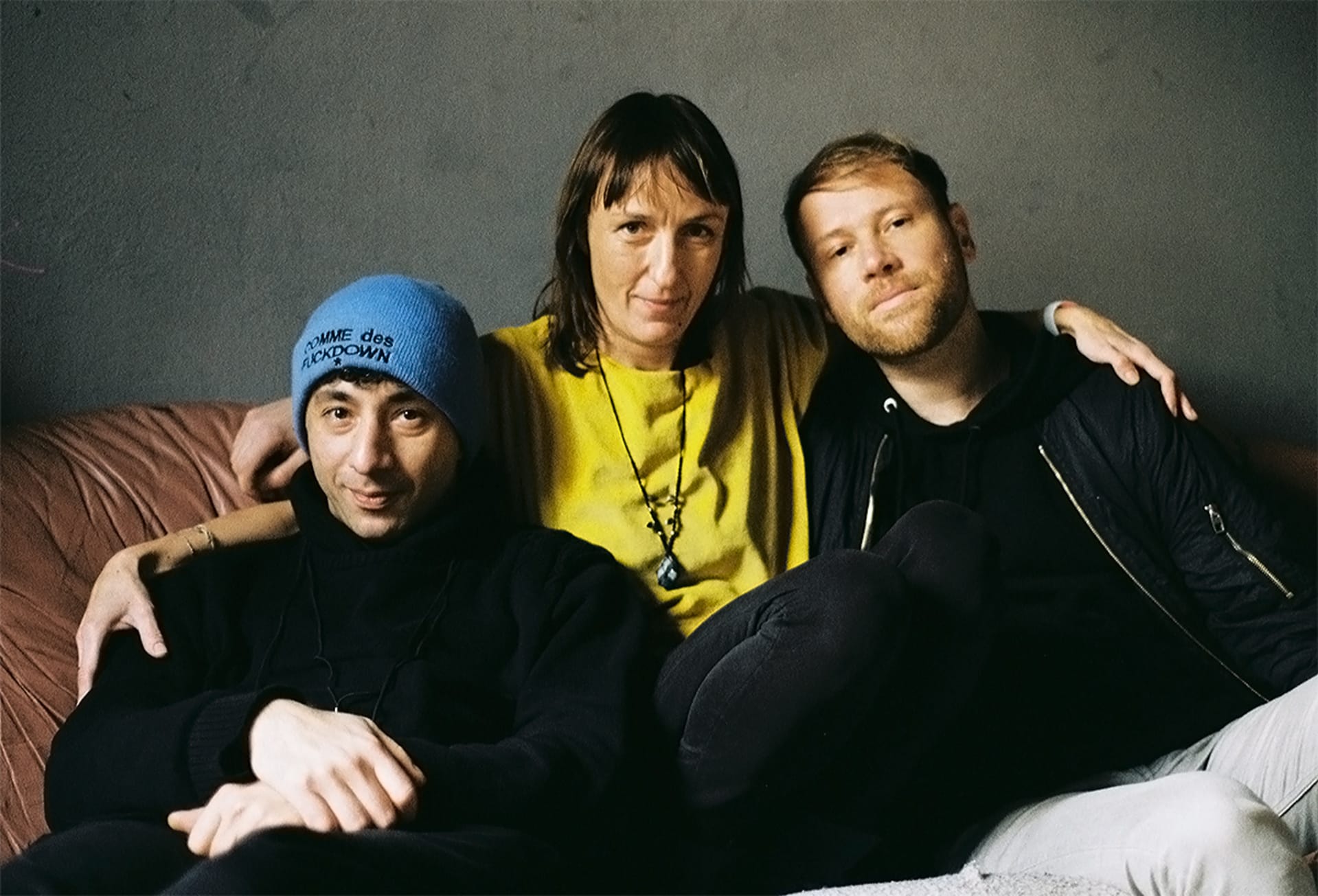
How STAUB, A “Techno Communist” Day Party, Quietly Became One Of Berlin’s Best Events
The monthly party at ://about blank is breaking with tradition by not announcing lineups.
STAUB, a monthly daytime event that takes place the last Saturday of every month at ://about blank, is one of Berlin’s best parties. But it’s historically operated behind a shroud of anonymity; the lineups are never announced, the STAUB Records artists are never revealed and the promoters skirt the sidelines of the dance floors, never putting themselves in the limelight.
In honor of the party’s six-year anniversary this weekend, we decided to take a deeper look at its impact on the scene. TEB editor Chloé Lula traveled to Detroit to see STAUB’s United States debut and discussed the party’s philosophy with its three organizers, Irakli, Ines and Jan (pictured above).
It’s twilight on Monday, May 28 and the sun is setting over the Detroit skyline. A tired but exuberant crowd is dancing on the back patio of the downtown venue TV Lounge, an off-Movement Festival space that plays host to afterparties throughout the duration of the country’s largest and oldest electronic music event. But on this final day of the Memorial Day weekend, the crowd isn’t dancing to the more standard musical offerings of local talent or US-based techno artists; they’re dancing to STAUB, a Berlin-based party that only recently touched down in Detroit.
STAUB’s appearance in the Motor City was its first in the US, and its famously anonymous booking concept fell counter to the heavily promoted Movement festivities that were happening a few blocks away. That the undisclosed STAUB headliners included major acts that played at the much more heavily publicized—and costly—festival the weekend before was not received without a touch of irony from the guests who were able to identify them.
STAUB’s organizers’ aversion to showmanship is already well-known in the party’s German hometown. The party has developed its reputation by offering a foil to most other Berlin club nights that release “running orders” stuffed with headliners and trending talent. The daytime event occurs every last Saturday of the month between 10 AM and 10 PM at Friedrichshain’s ://about blank. The back garden, which is open in the summer and covered with a tent in the colder months, is verdant with draping birch trees and scattered with seating made from repurposed industrial parts. Even in the winter, it’s typically full of black-clad guests that have either come fresh-faced or straight from the previous night’s party. The club’s inner two rooms are also rarely less than completely full with familiar faces, many of them STAUB affiliates, friends or regular party attendees, communing freely in the techno-filled empty spaces between each room.
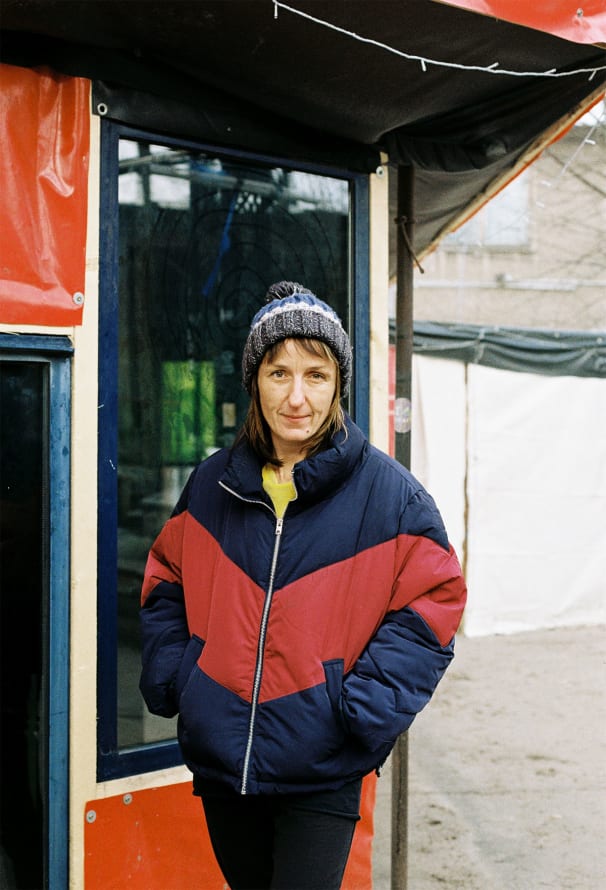
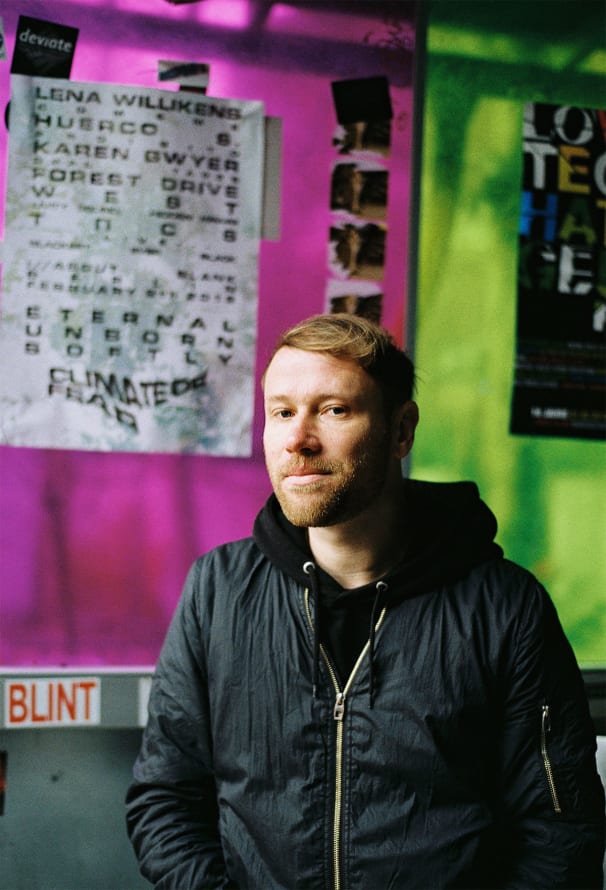
It would be fitting to characterize STAUB as familial. Its founders and curators—Irakli (who was also responsible for orchestrating our trip to Tbilisi last year), Jan (who is also the booker for Griessmuehle and the co-founder of the booking agency Quest) and Ines—have worked hard to foster a general mood of inclusion, kindness and tolerance. Their booking policies and refusal to work with agencies form the basis of a special atmosphere that easily translates between undergrounds in Berlin to more prominent stages halfway across the world, like in Detroit. It was early on in the event’s six-year history that the trio decided not to publicize the names of the party’s DJs at all; the events are completely lineup-less affairs that can only be discovered in real-time on the dance floor, where small pieces of paper next to ://about blank’s DJ booths state the play times for each respective stage.
The secretive nature of STAUB’s lineups ensures that both seasoned and up-and-coming artists alike can play during the event’s peak-time. It’s not uncommon to find an internationally acclaimed act like Cio D’or playing on one of the club’s three stages at a traditionally “off” hour, while a talented local DJ plays their first show at its peak. The concept is to be democratic in the booking and scheduling of talent.
“I call it techno communism,” Irakli said over a coffee at a Neukölln café. “Everyone contributes; everyone gets the same fee; and everyone gets the same treatment. But that’s what makes it fun.” When they launched the series, the already-seasoned organizing team of party promoters and artists knew that they didn’t want to participate in the politics surrounding the city’s dance music.
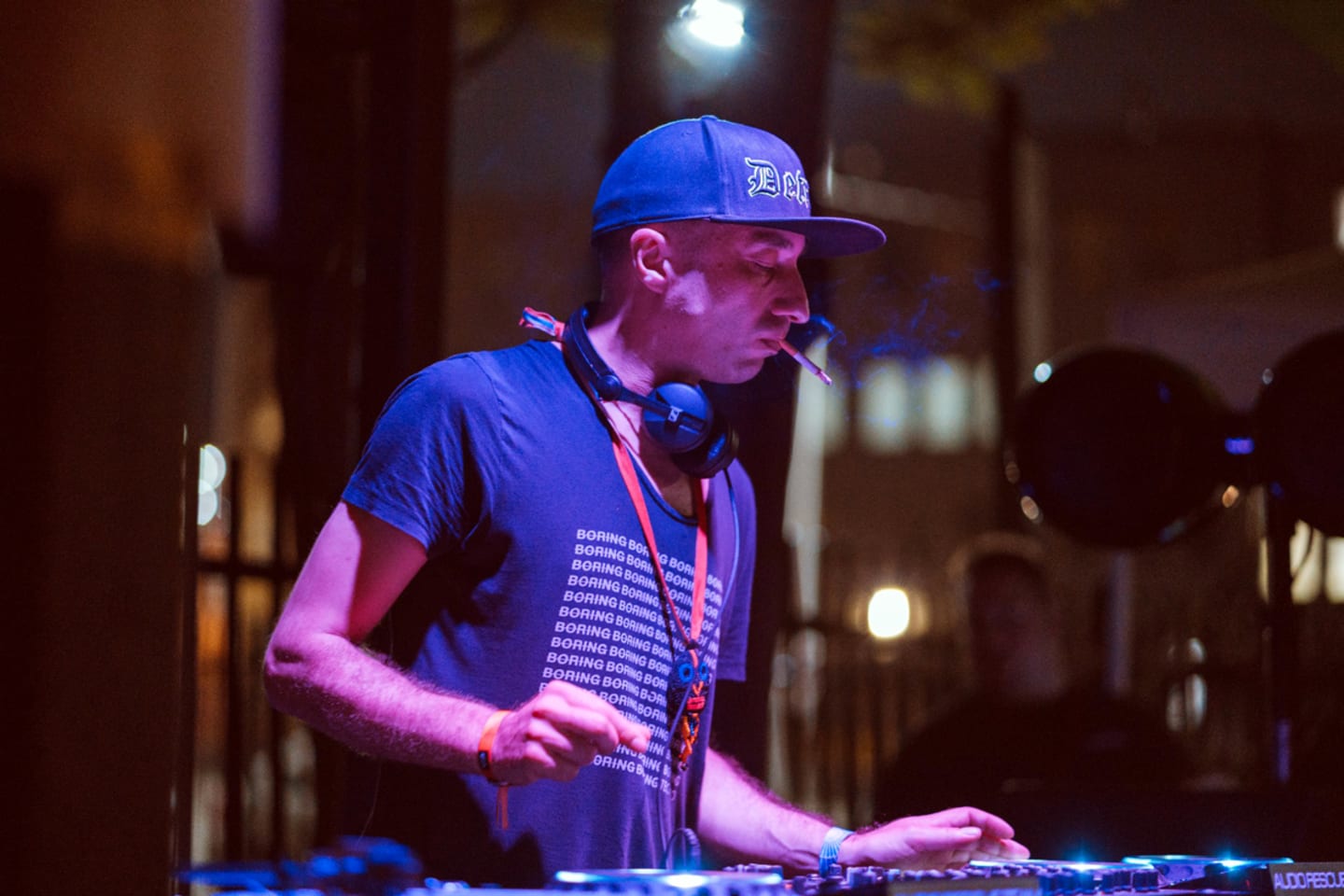
The contract rules surrounding a booking at a Berlin club can be strict. Booked DJs are typically asked to agree to terms in which they aren’t permitted to play anywhere else in the city for two weeks before or after the gig. And according to some clubs’ booking policies, that period can be extended to one month. An unannounced lineup affords STAUB’s performers more flexibility, both in terms of where they can play and what they can play. Up-and-coming artist and regular STAUB DJ Nur Jaber said that she found her voice in techno there after having been pigeonholed into house music bookings for years before. “I wanted to quit DJing,” she told me in an interview last year, “but when I got to STAUB, I was like, ‘Hell yeah. This is where I’m supposed to be.’ Joining them was a strong turning point in my artistic career…I felt like I belonged.”
While the cloak of anonymity certainly allows artists to experiment beyond their typical musical bounds, I also wondered whether it could be an obstacle in a city with such a competitive music industry as Berlin. When I asked Irakli whether the anonymous DJ policy sometimes worked to the party’s disadvantage, deterring bigger artists looking for the money and marketing advantages of being publicly announced on a bill, he said, somewhat surprisingly, that it was “the other way around.” “A lot of DJs who are famous and traveling a lot would rather play unannounced,” he said. “For them, it’s something honest and good. If you play for 50,000 people, probably 90% of them don’t care about the music. They’re there because it’s a popular event, or someone’s a superstar. But with our crowd, people care about the music.”
In its six years of existence, STAUB has become known for its consistently exceptional curation, the majority of which revolves around heavier hues of techno. But as the party has grown in popularity, the three-person production team has been forced to add stages so that its patrons have room to dance. Now with three stages in total—the main dance floor, the hall and the garden-side tent—there is the opportunity for more diverse programming, which Irakli has taken advantage of in his talent bookings. An artist asked to play on one of these stages, however, is not expected to conform within his or her set to any particular sound. An afternoon at the tent can be a display of genres as disparate as house, minimal, ambient, wave, disco or straight up four-to-the-floor.
This detachment from the implicit codes that govern the dance music scene can make playing and attending the party a more relaxing and judgement-free experience. But the open environment is unsurprising considering Jan’s, Ines’s and Irakli’s respective demeanors. Each of the founding members quietly exudes a vibe of calm and respect that informs the ethos of the party, from the people hired to work the door to the DJs, club personnel and dancers. They can also almost always be found on the STAUB dance floor at any hour during the party, drinking maté sodas, talking freely with guests and overseeing the operations of each of the club’s three stages.
“Maybe I tell myself I’ll leave a bit early because I just came back from a gig, or need to get ready for one,” Irakli said. “But it’s impossible.” “The three of us have never had any communication problems or differences or fights,” Ines added. “Sometimes before a party, I say, ‘I’m not in the mood for making a big party.’ But when I arrive, it’s always nice. I really can’t remember a STAUB that wasn’t nice for me.”
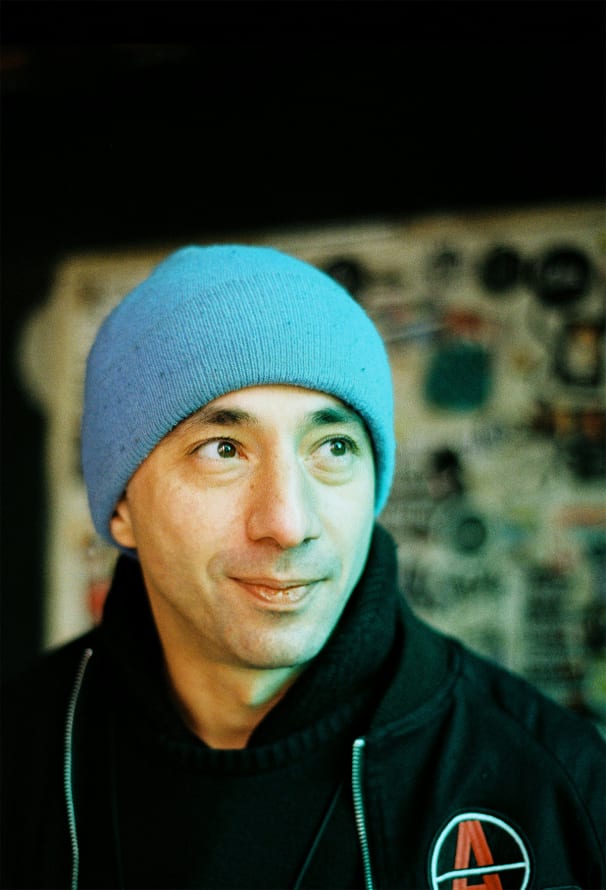
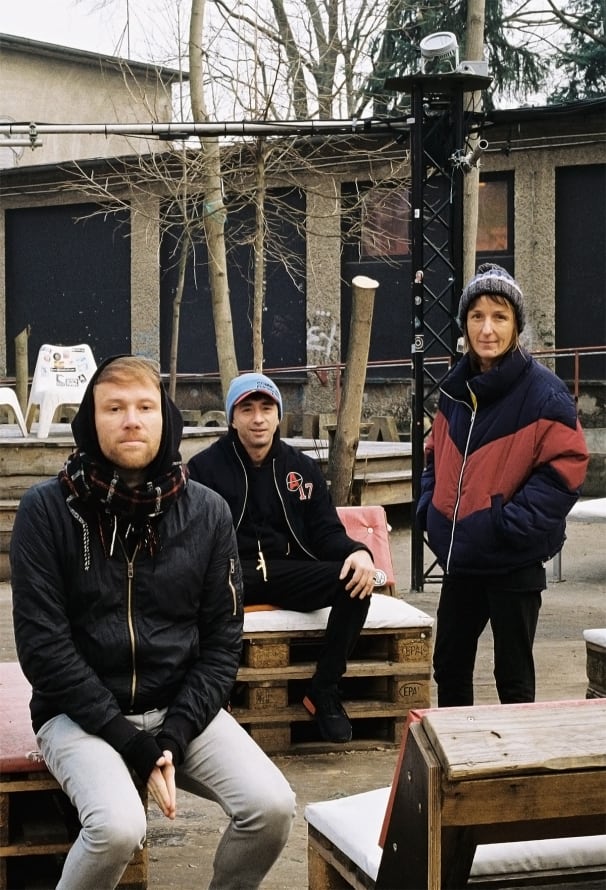
Before STAUB’s inaugural party in 2012, Ines had been throwing shows independently at ://about blank. When the series suddenly came to a halt, she asked Irakli if he was interested in teaming up with her to reignite the event on a different operational platform. The decision to host parties on Saturdays was a coupling of concept—”there was no techno during the day…all of the clubs in Berlin doing daytime parties were playing house and tech-house,” remembered Irakli—and opportunity. The club happened to only have daytime hours free for the following year, a window of time that also happened to be a less expensive option to use the space. Jan joined the duo when his efforts towards a day party in the backyard of a burger grill seemed more appropriately aimed towards a bigger collaboration.
Since 2016, three years into the STAUB’s existence, Irakli, Jan and Ines have extended the party to include a compilation-focused techno label. They have released three records since its inception, all of which have no tracklisting and no artist attributions. “Each record has various artists. One is always a very, very experienced producer, and each has at least one producer where it’s their first release,” Irakli explained. The compiled tracks are primarily culled from the same tight-knight artistic community that surrounds the party; but the majority of the producers who have appeared on STAUB wax are unknown. In our interview, the organizers would not even disclose the artist names to me. The fourth record on the STAUB imprint will come out this month in tandem with the 24-hour six-year anniversary party at ://about blank on February 22-23.
The STAUB name has grown in the last two years far beyond just the launch of its eponymous label, however. It has since hosted temporary residencies at clubs across Europe, including in Chemnitz, Hamburg, Leipzig, Dresden and further afield in Georgia and Austria. The trio receives requests to host guest parties in many cities, countries and continents, but their decisions to execute one-off nights with different promoters are generally based on a strong sense of kinship with the hosting parties. “It’s not just like two STAUB DJs go to another venue and play the music that we’d play at STAUB,” Irakli said. “There has to be the right atmosphere. And to create our special atmosphere, you need a special place with people who are doing special parties.”
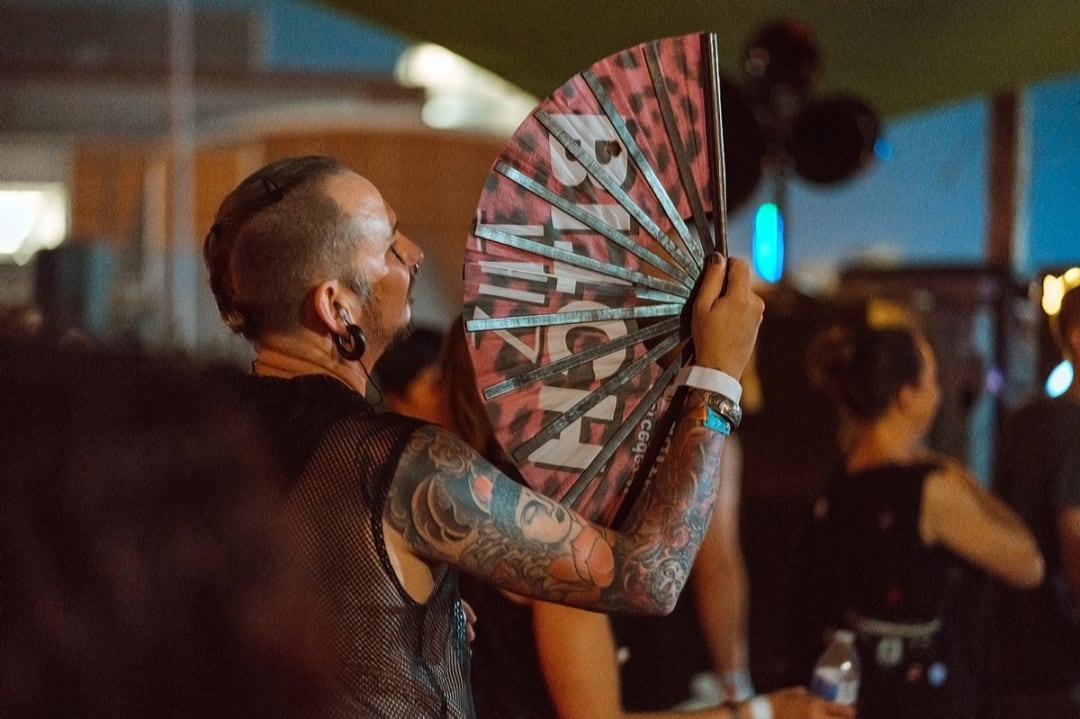

The move to Detroit this past May was a meaningful one, then. It was, to date, the furthest that the party has traveled to host a guest event. The gig was triggered by the obvious desire to play in the city that birthed techno, but it was equally inspired by a friendship with the event’s co-promoters, the Pittsburgh-based record label, Detour, and the Cleveland party, In Training. The former’s four members, Allison Cosby, Juan Lafontaine, Naeem Martinez-White and Alex Price have been hosting regular nights at Hot Mass for three years and will complete the figurative musical circle by playing special slots at the STAUB anniversary this month. Irakli and his partner in the now-defunct duo I/Y, Yacoub Chakarji, have also played at Aerin Ercolea’s In Training party themselves.
Despite the unconventionality of a Movement afterparty in which no artist names were announced at all, the gathering was, seemingly, a success. It was visited by hundreds of people from the Pittsburgh-affiliated Hot Mass and Detour crews as well as Detroit locals who heard the party’s hard-hitting techno, electro and acid from the neighboring street.
The vast majority of the guests at TV Lounge danced, unknowingly, to artists who had were in town for the Movement festival the day before. High-profile, international DJs spun alongside Midwest talent hailing from Detour and In Training. The diverse musical climate mirrored those of STAUB parties in Berlin, where the coming-together of disparate promoter groups, DJs and dancers stripped of the pretension of recognition created an environment that was deeply supportive and authentic. As a DJ at the event—as well as other Berlin-based STAUB events in the past—I can concede that it was truly one of the most enjoyable moments of my musical and party-going careers.

Irakli said that he was nervous about how the idiosyncratic format of the STAUB party would be received alongside a larger and historically more commercial event. “But at a certain point in the night, we were all so happy, and I had a feeling that this was the vibe that we were going for,” he recalled. “I remember someone was playing outside and it was getting dark against the Detroit skyline…I think that otherworldly moment is why we do this.” His decision to work with Detour and In Training stemmed from an intuitive feeling of musical and personal affinity despite having only met most of their participants in passing in Berlin, or through friends of friends. He added that it’s one thing to work with friends, but another to feel that you’re working towards a shared goal. “Sometimes there is magic between people, between parties, between crews or producers or clubs. This is why this party was important.”
While it’s tempting to say that the trio’s good fortune and rapid rise to local—and now worldwide—success has been the result of luck and hard work, it’s also undeniably the outcome of the organizers’ sharp ability to read people and an intuition to work with artists who, similarly, are not interested in playing by the industry’s standard rules. While STAUB and its affiliates are not outwardly political, they are, in their practices, carving out a bold message that runs against the grain of the mainstream. The space that they have created is populated with a family of likeminded people who all contribute what they do best; and, in many ways, it’s the same psychological domain that post-Cold War Berlin occupied, bringing disparate social groups together under one unique and equal umbrella. “We’ve never followed those rules,” Irakli said, “but now even more we don’t want to follow those rules. In my life, the best things have just happened without planning them.”
Their “techno-communist” philosophy is rather unusual in an increasingly for-profit commercial scene. But by not using booking agents, fees and marketing tactics, STAUB has succeeded in creating a unique island of authenticity in a niche that can be unrelentingly cutthroat for artists from every rung on the success ladder. The spirit of the party, then, is not unlike the free-willed attitude that has defined Berlin for decades. That Irakli, Jan and Ines are succeeding on an increasingly larger scale is not just by chance; it could be understood as a response to the dance music industry’s growing need for inclusion and equal opportunity in progressively destabilized economic and sociopolitical times.
Pre-order STAUB 004 on Bandcamp here. RSVP to the anniversary party this weekend on the Facebook event.
Published February 20, 2019. Words by Chloé Lula, photos by George Nebieridze.
